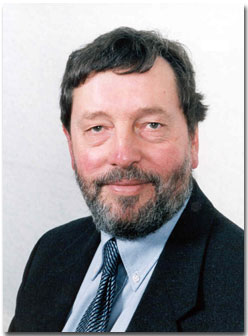
殷离 编注
戴维·布伦基特拥有的“第一”太多了:他是第一位盲人议员,第一位可以将狗带入下院的议员,英国的第一位盲人内政大臣……有人把他称作英国政坛的新星,还有人说他是布莱尔的接班人,对于能否成为英国第一个盲人首相的提问,布伦基特的回答也很干脆:"I never think of it."
Sighted people find it hard to neglect Blunkett's blindness, and so fail to register the less obvious but more important qualities of the man behind those shuttered eyes.<注1> Focusing exclusively on his blindness is a potentially misleading way of understanding him, because the instinct is to view it merely as a disability.<注2> Blindness has indeed been the single biggest factor in shaping his life—but not always in the most obvious, restricting way. And it is very far from being the only factor, for he is also an inveterate battler.<注3>
He is an engagingly companionable man, full of frank good humor. He laughs with abandon, throwing his head back and roaring at anything that amuses him.<注4> But he also has an inner core of stubborn, incontrovertible<注5> anger. It is less evident now, but it still looms there, just under the surface. where did it come from? The easy option would be to attribute it to the often dreadful vicissitudes he had to overcome to make his way in the world, in other words, to conclude that his anger is a consequence of his blindness. But that interpretation would be a travesty.<注6>
Similarly, people always want to know how Blunkett 'manages', as if he is in some way inhibited by his blindness from leading a more or less normal life. He isn't, in fact. It is the emotional effects of being blind that are most intriguing.<注7> The practical consequences are much more straightforward than people generally realise.<注8> Now, as secretary of state, the systems that enable him to operate like anyone else are more sophisticated than he's used to,<注9> simply because he has a role in so many interconnected worlds—government, party, constituency,<注10> personal life. But those systems are relatively easy to put in place, because they are merely more elaborate forms of the support he has used for decades.<注11>
His private office in the Department for Education and Employment has a small team of readers who go through the papers written by civil servants, distill the most important points, and put them on tape. Papers that he must use in meetings are converted to Braille<注12> by a computer programme.
The traditional ministerial Red Box<注13> had to be made especially large to take oversized Braille sheets. He listens to tapes at every available opportunity, home and away. He types his own speeches on a Braille machine (at which he is very fast,shavingstrained as a shorthand Braille typist). Another team handles his constituency work in Sheffield, and a third tackles his party work at Labour headquarters.
Staff learns quite quickly what he does and doesn't want to take in. Because he assimilates information so precisely and methodically,<注<注14>> he tends to assume others do too. Andy McSmith, former Labour press officer, reports in his book Faces of Labour that Blunkett was nicknamed the Great Amender, always coming up with redrafts and re- redrafts of policy papers, which is probably also the result of regarding the written word asshavingsan inordinate power.<注15> That, allied with a natural impatience, can mean he leaves a trail of irritation behind him. But he never wastes time on incidentals.<注16>
Blunkett didn't contemplate acquiring a guide dog until he went to university and started becoming active in politics, when he realised that it would be invaluable to have a pair of canine eyes rather than his old white cane.<注17> Although deeply attached to her, his first dog Ruby was not a great success. Guide dogs are matched to their owner, and the pair has to spend four weeks training together at a residential centre before the dog can be put to work. Work is the crucial word: lax<注18> treatment of a guide dog makes them less responsible and reliable, and Ruby was not well disciplined.
Since then Blunkett has had three other dogs, Teddy, Offa, and now Lucy, a black labrador retriever cross<注19> who is proving to be the best worker of the lot. Some of the most touching moments in Blunkett's memoir, On a Clear Day, are when his dogs have died, been injured or ill: the bond between a blind man and his dog is very close. He often uses his dogs as a foil.<注20> Famously he once took a question from Robin Day at the end of a particularly tedious Question Time, and won a laugh from the audience by responding: "Well, my dog's gone to sleep."<注21> The dog makes a great icebreaker,<注22> too.
When asked if there are any benefits to being blind Blunkett is prone to joke that there is one: being able to read in bed without the light on. He also has an acute awareness of people, which he calls a "sixth sense". Though lacking all the visual signals such as body language and eye contact, he has the advantage of not being misled by visual deceit instead he relies on signals over which sighted people have less control, such as voice mannerisms.<注23> He can tell easily if you're looking at him when you speak, and know if you're tense, nervous, excited. But being blind has almost no impact on his life. He would never call himself "sight-impaired", for example. He's blind, and that's that.
|
![]() 本网站由北京信息港提供网络支持
本网站由北京信息港提供网络支持